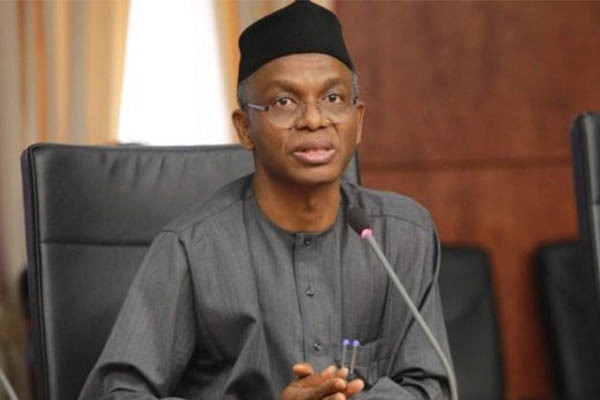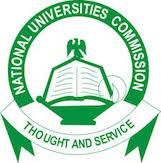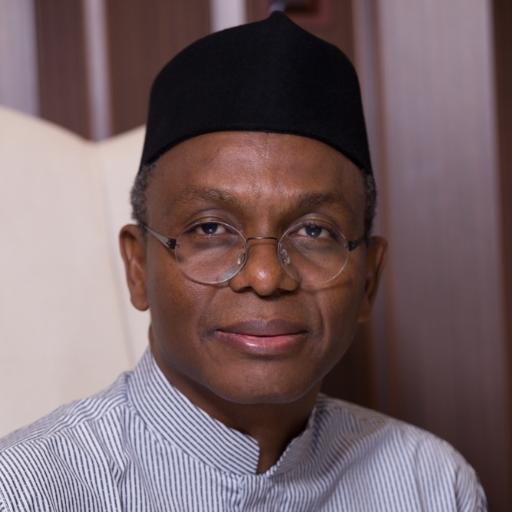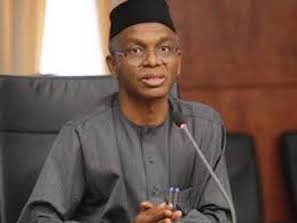NEWS
El-Rufai Inaugurate 21-Member Road Safety Advisory Council

Gov. Nasir El-Rufai of Kaduna State has inaugurated Kaduna State Road Safety Advisory Council (SaRSAC) to give guidance on a cohesive and efficient system to enhance overall safety.
Inaugurating the 21-member council, which will be chaired by the Deputy Governor, Dr Hadiza Balarabe, he said the advisory council would set state road safety targets and ensure coordination between states and local governments in achieving them.
The governor said that SaRSAC was to strengthen the giant strides that his administration has made towards enforcing traffic laws and returning sanity on the state roads.
El-Rufai recalled that his administration developed the State Transport Policy in 2017, which gave rise to the establishment of the Kaduna State Traffic Law Enforcement Agency (KASTLEA), the Kaduna State Road Agency (KADRA) and the Kaduna State Transport Regulatory Authority (KADSTRA).
“The Kaduna Urban Renewal Project is addressing the issues of safer mobility through massive road expansions and upgrades across the state to meet with global best practices and eliminate attendant hardship encountered by motorists as a result of bad roads,” he said.
The governor promised that government would provide all the support necessary to ensure the success of the advisory council.
‘’We will work together to achieve a new and higher level of safety on our roads in line with Global standards,’’ El-Rufai added.
He recalled the National Road Safety Advisory Council was inaugurated in February 2017 by the Vice President and each State was directed to inaugurate its own council.
According to him, the council is “to ensure zonal coordination to make inroads towards the success of the Councils. I myself represent the North-West zone on the National Council’’.
The governor lamented that road safety data indicated that more than 1.25 million people die on the world’s roads and tens of millions are seriously injured every year.
“This includes the toll on our young people, with road traffic crashes identified as the number one killer of young people aged 15–29 and the eighth leading cause of death among all people worldwide,’’ he said.
El-Rufai noted that “each year, developing countries lose between one per cent and three per cent of their gross domestic product (GDP) due to medical costs, productivity losses and other expenses resulting from deaths and injuries on the road, which is more than most of them receive in development aid.
‘’To respond to this, the United Nations General Assembly passed Resolution 64/2551 in March 2010, declaring the Global Decade of Action for Road Safety from 2010 to 2020.
“More recently is in February 2020, via Resolution 74/299, a second Decade of Action from 2021 to 2030 was proclaimed.
“The new proclamation stated a new target to reduce road deaths and injuries by 50 per cent by 2030,’’ the governor added.
In his Remarks, the Sector Commander Federal Road Safety Corps (FRSC), Kaduna state, Hafiz Mohammed, said the Nigeria Road safety Strategy (NRSS) 11 was designed to promote the application, including road infrastructural safety feature, vehicle safety features, travel speed, crash impact consideration and responses to prevent fatal and serious injuries.
Mohammed, who is also a member and Secretary of SaRSAC, made case for proper education for road users and training of drivers.
“To achieve these targets, there is need for combination of activities of the state road safety advisory council by the Technical Working Group (TWG) to be composed of technocrats and professionals from both the federal, state and private sectors,” Mohammed said.
This TWG, he said, shall be meeting at regular intervals to render progress being made on each of the five pillars of UN Decade of Action and render reports to SarSAC for consideration and action .
He said there should be quarterly Zonal Technical Working group meetings as part of the responsibility of Kaduna state being the coordinating State in North West to review Nigeria Road Safety strategy.
Mohammed therefore appealed to El-Rufai to approve a budget for the running of secretariat and coordinating the activities and programme of SaRSAC and TWG.
“We should be mindful of the financial resources necessary for the successful outcome of this programme.
“However, huge opportunities lay in harnessing resources from not only Federal Government, but also the organised private sector and multilateral development and donor agencies as major sources of financial support,” he added.
SaRSAC is to promote the application of safe system approach of five pillar matrix of road safety management.
The matrix also include road infrastructural safety features, vehicle safety features, travel speed, cash impact consideration and responses to prevent fatal and serious injuries.
It also emphasises on road user education and driver training.
Five state commissioners of Justice, Health, Education, Finance, Environment, State Planning Commission are members of the council.
Others are the commissioner of police, Nigeria Society of Engineers, NURTW and NARTO, among others. (NAN)
Education
Benue Orders Refund of N106,000 WAEC/NECO Fees charged by School

The Benue State Government, through the Education Quality Assurance and Examinations Board, BEQAE, has directed Jewel Model School, Makurdi, to immediately reverse the N106,000 being charged to parents for the registration of West African Examination Council, WAEC, and National Examinations Council, NECO, describing the levy as excessive and unjustifiable.
The directive followed a series of petitions from aggrieved parents who accused the school of imposing arbitrary examination fees.
Acting on the complaints, the Board summoned the school’s proprietor, principal and members of the Parents-Teachers Association, PTA executive to a meeting in Makurdi where they reportedly failed to justify the amount being demanded.
Speaking during the engagement, the Executive Secretary of BEQAEB, Dr. Terna Francis, clarified that the officially approved fee for WAEC registration was N28,000, while NECO was yet to announce its charges for the 2026 examinations.
“Schools are only permitted to collect officially approved examination fees, with a handling charge not exceeding N5,000 per examination,” Francis stated.
He further stressed that candidates were not mandated to register for both WAEC and NECO, noting that such decisions should be left to parents and students.
“Registration for WAEC and NECO is optional, not compulsory. Any additional costs must be transparently discussed and mutually agreed upon by parents, not imposed without consultation,” he added.
Francis also expressed concern over reports that parents at the school had been denied platforms to air their views, alleging that PTA meetings had not been held for nearly two years and that parents were restricted from commenting on the school’s WhatsApp communication platform.
He equally condemned the practice of routing school and examination payments through the proprietor’s personal bank account, describing it as a breach of accountability and transparency.
“Such practices undermine proper auditing and are unacceptable in a regulated educational system,” he said.
Francis consequently, directed the Director of Enforcement and Compliance Operations, Rev. Fr. Dr. Terungwa Tor, to place the school under close monitoring to ensure full compliance with the Board’s directives.
Warning against the exploitation of parents, Francis noted that schools found imposing undue financial burdens on learners risk severe sanctions, including the withdrawal of their operating licenses.
“These exploitative practices only worsen the problem of out-of-school children, which the government is determined to address,” he said.
Education
UNIZIK: Students Urge FG to Implement Industrial Court Judgment, Reinstate Odoh as VC

Some students of Nnamdi Azikiwe University (UNIZIK), Awka, have called on the Federal Government to fully implement the judgment of the National Industrial Court by reinstating Professor Bernard Odoh as Vice-Chancellor of the institution.
The students, operating under the aegis of the Nigerian Students and Youth Association, UNIZIK chapter, urged the Minister of Education to act without further delay in reinstating Professor Odoh, in strict compliance with the court’s ruling.
President of the group, Chisom Nwangwu, recalled that Professor Odoh was removed from office by the Federal Ministry of Education following allegations that he was not a professor and therefore unqualified to occupy the position.
However, he said the National Industrial Court had since affirmed that Professor Odoh was duly promoted to the rank of professor in 2015 and consequently ordered that all his rights, entitlements and privileges be fully restored.
Nwangwu stressed that respect for court judgments is fundamental to nation-building and should not be treated as optional, urging Nigerians and government institutions to obey court orders if the country is to be firmly rooted in the rule of law.
He expressed concern that the continued failure to implement the court’s ruling, especially in a situation where the office of the Vice-Chancellor was neither legally nor practically vacant, sets a dangerous precedent.
“This persistent disregard for a valid court order undermines democratic values and sends the wrong signal to citizens. Such actions should not be allowed to define us as a people or as a democratic society,” Nwangwu said.
He noted that Professor Odoh is the first alumnus of Nnamdi Azikiwe University to be appointed Vice-Chancellor, describing his removal as regrettable and driven by what he termed malicious claims aimed at frustrating a young academic with a progressive vision for the development of the university.
The student leader also appealed to President Bola Tinubu to intervene in the matter, noting that his administration is anchored on the principles of justice, fairness and respect for the rule of law.
According to him, such an intervention would help reaffirm public confidence in democratic institutions and reassure young Nigerians that justice, fairness and equality before the law remain attainable in the country.
| ReplyReply allForwardAdd reaction |
Education
NUC Opens Nigeria’s University Space to Foreign Institutions

The National Universities Commission (NUC) has lifted the embargo on the establishment and operation of foreign universities in Nigeria, a move aimed at attracting foreign direct investment and boosting the global competitiveness of the country’s higher education system.
The Executive Secretary of the NUC, Professor Abdullahi Yusufu Ribadu, announced the decision at the weekend during the 10th convocation ceremony of Gregory University, Uturu, Abia State.
He said the policy shift was designed to deepen international collaboration and strengthen the quality of university education in Nigeria.Represented at the event by Offor Chukwuemeka, Ribadu explained that foreign universities would be allowed to operate in Nigeria through six approved partnership models: franchise arrangements, branch campuses, twinning or articulation programmes, open and distance learning, acquisition, and teaching institutions.
He said the Commission had also introduced a Code of Governance for private universities to ensure uniform standards, transparency, and accountability in their operations. In addition, Ribadu noted that the NUC had carried out major curriculum reforms, replacing the Benchmark Minimum Academic Standards (BMAS) with the Core Curriculum and Minimum Academic Standards (CCMAS).
Under the new framework, he said, the NUC provides 70 per cent of compulsory core courses required for graduation, while universities are allowed 30 per cent flexibility to customise their curricula in line with their areas of expertise and emerging global trends.
The NUC boss emphasised that the reforms were geared towards equipping Nigerian graduates with 21st-century skills and enhancing their employability. He commended Gregory University for its contributions to educational innovation and development.
Abia State Governor, Dr. Alex Otti, in his remarks, praised the founder of the institution, Professor Gregory Ibe, for his vision and commitment to quality education. Represented by the Commissioner for Tertiary Education, Professor Uche Eme Uche, the governor reaffirmed his administration’s support for educational transformation in the state.
The Vice-Chancellor of Gregory University, Professor Cele Njoku, disclosed that the university had grown from three colleges to 12 in 13 years, now boasting over 53 academic departments. She added that all eight academic programmes submitted to the NUC in 2024 received full accreditation, while new courses, including Artificial Intelligence and major foreign languages, had been introduced.
Founder of the university, Prof. Gregory Ibe, represented by the Pro-Chancellor, Prof. Augustine Uwakwe, said the institution was established to make quality education accessible to Nigerians and pledged continued investment in education.
The overall best graduating student, Master Onyechere Chinedum Yadirichukwu, who graduated with a CGPA of 4.91, urged young Nigerians to take responsibility for shaping the nation’s future.
The convocation ceremony also featured the award of honorary doctorate degrees to former Enugu State Governor Ifeanyi Ugwuanyi; Chairman of the Abia State Council of Traditional Rulers, HRM Eze Linus Nto Mba; and Chairman of the Manufacturers Association of Nigeria, Imo State chapter, Dr Okenze Sylvester Obinna.
























